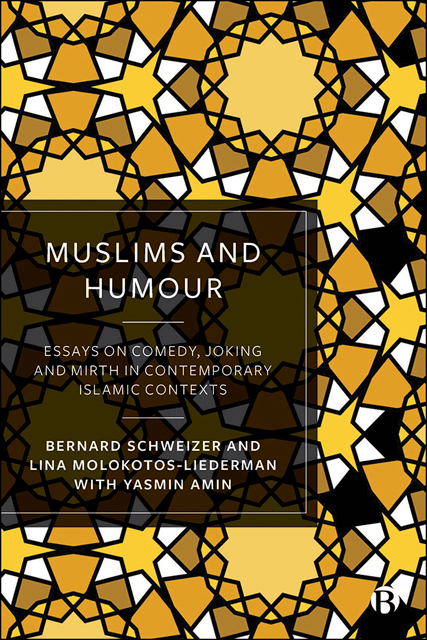Book contents
- Frontmatter
- Contents
- Notes on Contributors
- Acknowledgements
- Introduction
- Part I Theoretical Perspectives on Islam and Humour
- Part II Muslim Humour Practices in Islamicate Societies: Textual Media
- Part III Muslim Humour Practices in Islamicate Societies: Visual Media and Performance
- Part IV Muslim Comedy in North America
- Conclusion
- Bibliography on Islam and Humour
- Index
10 - Queering Islam in Performance: Gender and Sexuality in American Muslim Women’s Stand-up Comedy
Published online by Cambridge University Press: 13 October 2022
- Frontmatter
- Contents
- Notes on Contributors
- Acknowledgements
- Introduction
- Part I Theoretical Perspectives on Islam and Humour
- Part II Muslim Humour Practices in Islamicate Societies: Textual Media
- Part III Muslim Humour Practices in Islamicate Societies: Visual Media and Performance
- Part IV Muslim Comedy in North America
- Conclusion
- Bibliography on Islam and Humour
- Index
Summary
Introduction: What kind of Muslim are you?
American Muslim stand-up comedy is a very American cultural practice that showcases the diversity of this religious community in various clubs, performance halls, and in social media spaces such as YouTube. In their performances, comics draw from personal experiences to describe and critique stereotypes and assumptions about what it means to be Muslim in America today. Travina Springer (2017), a Black comic who recently converted to Islam, jokes about how she has to deal with others’ expectations of her new religious identity:
‘People are like, “But what kind of Muslim are you? Are you like … Muslim-Muslim?” [laughter] I’m like, you know, I am regular. Like, “As seen on TV.” [laughter] That kind of Muslim. But not the angry one! I’m not angry. Come on – look at my face!’ [smiles broadly]
Comic Zahra Noorbakhsh (2016b) similarly addresses what people may expect of her, an Iranian American Muslim, with a joke that describes her diverse lifestyles: ‘I usually identify myself as the pork-eating, alcoholdrinking, pre-marital-sex-having kind of Muslim right away. [laughter] Yeah. Pork eaters in the house!’
What kind of Muslim are you? These performers are in fact many different kinds of being Muslim – they are Black, female, eat pork, drink alcohol, and have sex outside of marriage. Jokes like these illustrate how Muslim humourists are challenging standard assumptions and are literally embodying a diverse American religious community – one that includes their backgrounds, experiences, and identities. Yet comics like Springer and Noorbakhsh are not typical performers in a genre usually known for and defined by its heteronormativity. They are part of a trend in stand-up humour that I argue queers (see below) the ways in which the American Muslim community and Islam are defined, particularly in terms of gender, sexuality, and the body. In performances that are more than simple entertainment, these humourists testify to the many kinds of being American and Muslim that includes both genders, diverse sexualities, and various abilities. This chapter draws from the recent stand-up humour of American Muslim performers who identify as women, and some as LGTBQ+ , who speak on matters related to religion, gender, and sexuality in their performance material.
- Type
- Chapter
- Information
- Muslims and HumourEssays on Comedy, Joking, and Mirth in Contemporary Islamic Contexts, pp. 225 - 244Publisher: Bristol University PressPrint publication year: 2022



